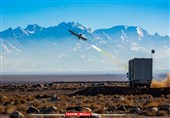Syrian President Bashar al-Assad Arrives in Saudi Arabia for Arab League Summit
TEHRAN (Tasnim) - Syrian President Bashar al-Assad has arrived in Saudi Arabia to participate in an Arab League summit, marking his first attendance since the onset of foreign-backed militancy over a decade ago.
The invitation was extended by King Salman bin Abdulaziz Al Saud himself, and Assad landed at King Abdulaziz International Airport in Jeddah on Thursday. Syrian state television confirmed his arrival, reporting that he would be attending the 32nd regular session of the 22-member bloc the following day.
On May 10, the Syrian presidency announced that the 57-year-old leader had received an invitation to the May 19 Arab summit in Saudi Arabia. In response, Assad stated that the summit "will enhance joint Arab action to achieve the aspirations of the Arab peoples," according to a statement released by the Syrian presidency. The invitation was delivered by Saudi Arabia's Ambassador to Jordan, Nayef bin Bandar al-Sudairi.
Earlier this month, Arab government representatives in Cairo voted to reinstate Syria's membership in the Arab League, ending its 12-year suspension. All 13 member states that attended the session endorsed the decision. However, there is still no unanimous agreement among Arab nations regarding the normalization of ties with Damascus. Notably absent from the meeting was Qatar, which continues to support so-called moderate opposition groups against the Syrian government.
The vote in Egypt's capital followed discussions among top Arab diplomats in Jordan, where a roadmap to reintegrate Syria into the Arab League was deliberated. The decision also includes a commitment to ongoing dialogue with Arab governments, aimed at gradually achieving a political solution to the conflict in line with UN Security Council Resolution 2254. Furthermore, the Arab League has established a communications committee comprising Saudi Arabia, Lebanon, Jordan, and Iraq to monitor the progress.
Syria's membership in the Arab League was suspended in November 2011, citing an alleged crackdown on opposition protests by the Damascus government. Syria has denounced the suspension as "illegal and a violation of the organization's charter." As of late, more countries and political parties have voiced support for reversing the suspension and reinstating Syria's position in the Arab League.
In March, Riyadh and Damascus reached an agreement to restore diplomatic relations and reopen embassies after a hiatus of over a decade. Assad has already visited the United Arab Emirates (UAE) and Oman, and further visits to Arab states are expected in the near future. The process of détente gained momentum after Iran and Saudi Arabia signed a deal to restore diplomatic relations and reopen embassies, marking an end to their seven-year estrangement. Observers anticipate that the deal, signed in China, will foster greater collaboration among Muslim nations to address regional challenges.
Despite efforts by Israel and certain Western states to isolate Syria, an increasing number of regional countries, including the UAE, Egypt, Jordan, and Oman, have expressed readiness to resume diplomatic relations with Damascus.






